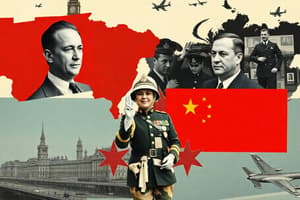Podcast
Questions and Answers
What is the primary focus of the academic discipline of international relations?
What is the primary focus of the academic discipline of international relations?
- Studying interactions between states and international organizations (correct)
- Analyzing economic policies within a country
- Focusing on national politics
- Exploring cultural traditions at a regional level
Which historical event influenced the emergence of international relations as an academic discipline?
Which historical event influenced the emergence of international relations as an academic discipline?
- Industrial Revolution
- French Revolution
- Cold War
- World War I (correct)
What concept did Woodrow Wilson's Fourteen Points emphasize in relation to international relations?
What concept did Woodrow Wilson's Fourteen Points emphasize in relation to international relations?
- Economic sanctions
- Open covenants of peace (correct)
- Militarization
- Isolationism
Which aspect is NOT included in the various aspects of global politics covered by international relations?
Which aspect is NOT included in the various aspects of global politics covered by international relations?
In what country did international relations emerge as a distinct academic discipline during the early 20th century?
In what country did international relations emerge as a distinct academic discipline during the early 20th century?
What is the central practice associated with diplomacy as discussed in international relations?
What is the central practice associated with diplomacy as discussed in international relations?
What is the focus of the study of international law?
What is the focus of the study of international law?
Which field of study deals with analyzing how cultural factors influence international relations?
Which field of study deals with analyzing how cultural factors influence international relations?
What is the primary focus of intelligence in the context of international relations?
What is the primary focus of intelligence in the context of international relations?
Which concept refers to the idea that regional cooperation can help address global challenges?
Which concept refers to the idea that regional cooperation can help address global challenges?
What does the study of ethics in international relations primarily involve?
What does the study of ethics in international relations primarily involve?
Which issue highlights the changing role of traditional powers like the United States in international relations?
Which issue highlights the changing role of traditional powers like the United States in international relations?
Flashcards are hidden until you start studying
Study Notes
International Relations: An Overview
International relations is the study of the interactions and relationships between states, international organizations, and subnational entities such as bureaucracies, political parties, and interest groups. It encompasses various aspects of global politics, including diplomacy, intelligence, war, diplomatic recognition, new regionalism, law, economics, ethics, strategy, philosophy, culture, and the environment. The field has its roots in the early 20th century, particularly in the United States, as the country grew in power and influence.
Historical Development
International relations emerged as a distinct academic discipline during the early 20th century, influenced by the desire to find less dangerous and more effective means of conducting relations between nations and peoples. This was driven by the belief that systematic observation and inquiry could dispel ignorance and serve human betterment. Woodrow Wilson's Fourteen Points, which advocated for open covenants of peace and the promotion of education in international affairs, further solidified the field's focus on international cooperation and war and peace.
Key Concepts
International relations is concerned with various aspects of international affairs, including:
- Diplomacy: The practice of conducting negotiations and maintaining relations between states and international organizations.
- Intelligence: The gathering and analysis of information for national security purposes.
- War: The armed conflict between states or non-state actors.
- Diplomatic recognition: The formal acknowledgment of a state's sovereignty by another state.
- New regionalism: The idea that regional cooperation can help address global challenges.
- Law: The study of international legal norms and institutions.
- Economics: The analysis of economic interactions between states and the role of international organizations in economic affairs.
- Ethics: The examination of moral principles in international relations.
- Strategy: The development of plans and actions to achieve political objectives.
- Philosophy: The exploration of fundamental questions about the nature of international relations and their implications for policy.
- Culture: The study of how cultural factors influence international relations.
- Environment: The examination of the impact of environmental factors on international relations.
Current Challenges and Issues
International relations is a dynamic field that continually evolves in response to current global issues and challenges, such as:
- Geopolitical shifts: The rise of new powers like China and the changing role of traditional powers like the United States.
- Economic interdependence: The impact of globalization on international relations and its potential for cooperation or conflict.
- Climate change: The role of international cooperation in addressing global environmental challenges.
- Security threats: The evolving nature of security threats, including cybersecurity, terrorism, and nuclear proliferation.
- Human rights and democracy: The role of international organizations and states in promoting human rights and democracy.
In conclusion, international relations is a multifaceted field that examines the complex interactions between states, international organizations, and subnational entities. Its historical development, key concepts, and current challenges reflect the dynamic nature of global politics and the importance of understanding the interplay between various actors and issues on the international stage.
Studying That Suits You
Use AI to generate personalized quizzes and flashcards to suit your learning preferences.




